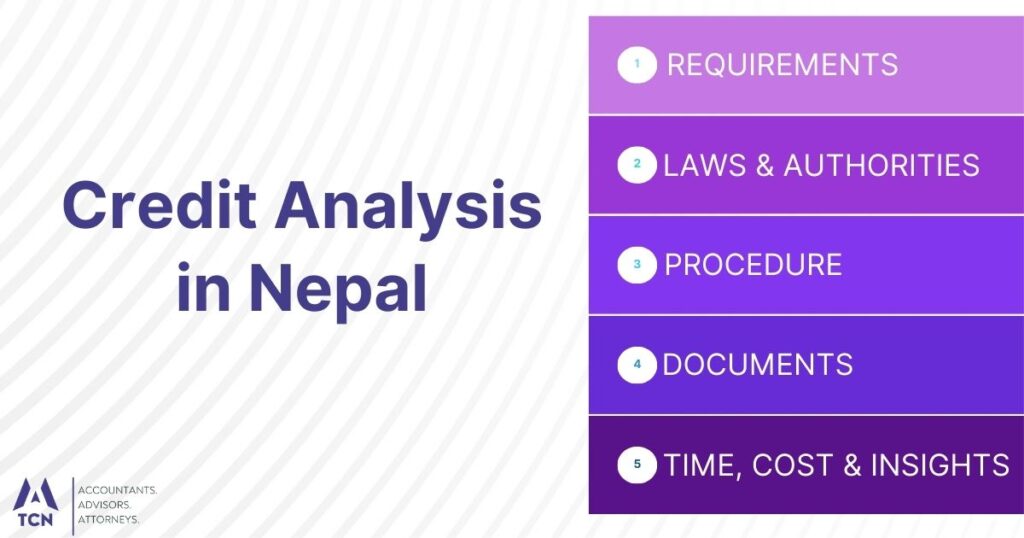Credit analysis is the process of evaluating the creditworthiness of individuals, businesses, or entities seeking loans or financial assistance. In Nepal, credit analysis plays a crucial role in the financial sector, helping lenders make informed decisions about extending credit.
Credit analysis involves:
- Assessing the borrower’s ability to repay loans
- Evaluating financial stability and risk factors
- Determining appropriate loan terms and conditions
The importance of credit analysis in Nepal includes:
- Reducing default risks for lenders
- Promoting responsible lending practices
- Supporting economic growth through informed credit decisions
- Protecting both lenders and borrowers from financial distress
What factors are considered in credit analysis?
Credit analysis in Nepal considers various factors to assess creditworthiness:
- Income and employment stability
- Debt-to-income ratio
- Credit history and repayment behavior
- Assets and liabilities
- Business performance (for commercial loans)
- Market conditions and industry trends
- Collateral value and quality
- Management experience and expertise
- Cash flow projections
- Legal and regulatory compliance
How is credit analysis conducted in Nepal?
Credit analysis in Nepal typically follows these steps:
- Application review: Lenders examine loan applications and supporting documents.
- Financial statement analysis: For businesses, financial statements are scrutinized.
- Credit report retrieval: Credit reports are obtained from credit bureaus.
- Income verification: Lenders verify the applicant’s income sources.
- Collateral assessment: Evaluation of assets offered as collateral.
- Risk assessment: Analysis of potential risks associated with the loan.
- Credit scoring: Assigning a credit score based on various factors.
- Decision-making: Determining whether to approve, reject, or modify the loan request.
What tools are used for credit analysis?
Credit analysts in Nepal use various tools to conduct thorough assessments:
- Credit scoring models
- Financial ratio analysis software
- Cash flow projection tools
- Credit bureau reports
- Risk assessment matrices
- Industry benchmarking databases
- Economic forecasting models
- Loan origination systems
- Document verification software
- Fraud detection tools
How to interpret credit scores and reports?
Interpreting credit scores and reports in Nepal involves:
- Understanding the scoring range (e.g., 300-900)
- Identifying key factors affecting the score
- Analyzing payment history and outstanding debts
- Assessing credit utilization ratios
- Evaluating the length of credit history
- Considering recent credit inquiries
- Reviewing public records (e.g., bankruptcies, liens)
- Comparing scores to industry benchmarks
- Identifying trends in credit behavior over time
- Recognizing the impact of different types of credit accounts
What role does financial statement analysis play?
Financial statement analysis is essential in credit analysis for businesses in Nepal:
- Balance Sheet Analysis:
- Assessing asset quality and liquidity
- Evaluating debt levels and equity structure
- Identifying potential red flags in financial position
- Income Statement Analysis:
- Analyzing revenue trends and profitability
- Evaluating operating expenses and efficiency
- Assessing the sustainability of earnings
- Cash Flow Statement Analysis:
- Evaluating cash generation from operations
- Assessing investment and financing activities
- Determining the ability to service debt obligations
- Ratio Analysis:
- Calculating and interpreting financial ratios
- Comparing ratios to industry benchmarks
- Identifying trends and potential areas of concern
How to assess creditworthiness of individuals and businesses?
Assessing creditworthiness in Nepal involves:
For Individuals:
- Reviewing credit reports and scores
- Analyzing income stability and sources
- Calculating debt-to-income ratios
- Evaluating assets and liabilities
- Assessing payment history and behavior
- Considering employment history and job stability
- Reviewing recent major financial events (e.g., bankruptcies)
For Businesses:
- Analyzing financial statements and ratios
- Evaluating business plans and projections
- Assessing industry trends and market position
- Reviewing management experience and expertise
- Analyzing cash flow and working capital management
- Evaluating collateral and guarantees
- Considering legal and regulatory compliance
What are common red flags in credit analysis?
Common red flags in credit analysis in Nepal include:
- Frequent late payments or defaults
- High credit utilization ratios
- Rapid increase in debt levels
- Inconsistent or declining income
- Frequent job changes or unemployment periods
- Negative cash flow or operating losses
- Excessive reliance on short-term debt
- Inadequate collateral or guarantees
- Legal issues or regulatory non-compliance
- Rapid expansion without proper financial planning
How does credit analysis differ for various loan types?
Credit analysis varies based on loan types in Nepal:
Personal Loans:
- Focus on individual income and credit history
- Emphasis on debt-to-income ratios
- Consideration of personal assets and liabilities
Business Loans:
- In-depth analysis of financial statements
- Evaluation of business plans and projections
- Assessment of industry trends and market position
Mortgage Loans:
- Emphasis on property valuation and loan-to-value ratios
- Consideration of long-term income stability
- Analysis of debt service coverage ratios
Agricultural Loans:
- Assessment of crop yields and market prices
- Evaluation of seasonal cash flow patterns
- Consideration of weather risks and insurance coverage
What is the importance of credit history in analysis?
Credit history plays a vital role in credit analysis in Nepal:
- Provides insights into past repayment behavior
- Helps predict future credit performance
- Influences credit scores and loan terms
- Reveals patterns of financial responsibility
- Assists in identifying potential risks
- Supports fair and objective lending decisions
- Encourages responsible borrowing habits
- Facilitates faster loan processing for good credit histories
How to evaluate collateral in credit analysis?
Evaluating collateral in Nepal involves:
- Determining the type and quality of collateral
- Assessing the market value of the collateral
- Calculating loan-to-value ratios
- Considering the liquidity of the collateral
- Evaluating potential depreciation or appreciation
- Assessing legal ownership and encumbrances
- Determining the cost of maintaining or liquidating collateral
- Considering insurance coverage for the collateral
- Evaluating the correlation between collateral value and loan purpose
- Assessing the ease of repossession in case of default
Contract Drafting Process in Nepal
Corporate Restructuring Process in Nepal
Bank Reconciliation in Nepal
What are the legal aspects of credit analysis in Nepal?
Legal aspects of credit analysis in Nepal include:
- Compliance with Nepal Rastra Bank regulations
- Adherence to the Banks and Financial Institutions Act
- Compliance with anti-money laundering (AML) regulations
- Consideration of consumer protection laws
- Proper documentation and disclosure requirements
- Compliance with data protection and privacy laws
- Adherence to fair lending practices
- Consideration of bankruptcy and insolvency laws
- Proper handling of collateral and security interests
- Compliance with foreign exchange regulations for international loans
How to use credit analysis for risk management?
Credit analysis supports risk management in Nepal through:
- Identifying potential default risks
- Determining appropriate loan terms and conditions
- Setting risk-based pricing for loans
- Establishing loan loss reserves
- Developing risk mitigation strategies
- Monitoring ongoing credit quality
- Implementing early warning systems for potential defaults
- Diversifying loan portfolios to spread risk
- Conducting stress tests on loan portfolios
- Developing and refining credit policies and procedures
What are best practices in credit analysis?
Best practices in credit analysis in Nepal include:
- Maintaining objectivity and independence
- Conducting thorough due diligence
- Utilizing multiple sources of information
- Regularly updating credit analysis methodologies
- Implementing standardized credit scoring models
- Conducting regular portfolio reviews
- Providing ongoing training for credit analysts
- Implementing strong internal controls and audits
- Utilizing technology to enhance efficiency and accuracy
- Collaborating with other departments for comprehensive analysis
How has technology impacted credit analysis?
Technology has significantly impacted credit analysis in Nepal:
- Automated credit scoring models
- Big data analytics for risk assessment
- Artificial intelligence for pattern recognition
- Blockchain for secure data sharing
- Cloud computing for scalable data processing
- Mobile applications for real-time credit decisions
- Digital document verification systems
- Machine learning for predictive analytics
- API integrations for seamless data exchange
- Robotic process automation for routine tasks
Additional FAQs:
How often should credit analysis be updated?
Credit analysis should be updated:
- Annually for existing borrowers
- Before each new loan application
- When significant changes occur in the borrower’s financial situation
- During regular portfolio reviews (e.g., quarterly for high-risk loans)
What is the cost of professional credit analysis?
The cost of professional credit analysis in Nepal varies based on:
- Complexity of the analysis
- Size of the loan or credit facility
- Type of borrower (individual or business)
- Depth of financial information required
- Use of specialized tools or databases
Costs may range from a few thousand Nepalese Rupees for simple analyses to several lakhs for complex corporate credit assessments.
How does economic conditions affect credit analysis?
Economic conditions impact credit analysis in Nepal by:
- Influencing interest rates and borrowing costs
- Affecting business performance and cash flows
- Impacting employment rates and income stability
- Altering collateral values (e.g., real estate prices)
- Changing industry trends and market dynamics
- Affecting currency exchange rates for international loans
- Influencing government policies and regulations
Can credit analysis predict future financial behavior?
Credit analysis can provide insights into potential future financial behavior by:
- Analyzing historical patterns and trends
- Utilizing predictive modeling techniques
- Considering economic and industry forecasts
- Evaluating management plans and projections
- Assessing the impact of external factors on creditworthiness
However, it’s important to note that credit analysis is not infallible and unforeseen circumstances can always impact future financial behavior.
What role do credit bureaus play in Nepal?
Credit bureaus in Nepal, such as Karja Suchana Kendra Limited, play a crucial role by:
- Collecting and maintaining credit information
- Providing credit reports to financial institutions
- Supporting the credit scoring process
- Facilitating responsible lending practices
- Helping borrowers build and maintain good credit histories
- Assisting in fraud detection and prevention
- Supporting overall financial stability in the country
How to improve creditworthiness based on analysis?
To improve creditworthiness based on credit analysis in Nepal:
- Pay bills and loan installments on time
- Reduce overall debt levels
- Maintain low credit utilization ratios
- Diversify credit mix (e.g., secured and unsecured loans)
- Avoid applying for multiple loans in a short period
- Maintain stable employment and income sources
- Build a longer credit history
- Regularly review and dispute any errors in credit reports
- Provide collateral or guarantees for loans when possible
- Improve financial management and record-keeping practices
By following these strategies, individuals and businesses can enhance their creditworthiness and improve their chances of obtaining favorable loan terms in Nepal.
Get in Touch with Us
Our team consists of Chartered Accountants, Corporate Lawyers and Chartered Financial Analysts. Our Firm is renowned for provide expert legal, tax and financial services. Contact us for Quick Legal and Tax Consultation.
📧 Email: info@taxconsultantnepal.com
📞 Phone: +977 9709090127
📍 Location: Sinamangal Marga, Old Baneshwor, Kathmandu, Nepal
You can contact us via email, contact form, or phone call. We are also available on WhatsApp, Viber, Telegram, and WeChat for your convenience. Feel free to drop your queries, and our professionals will get back to you promptly.


